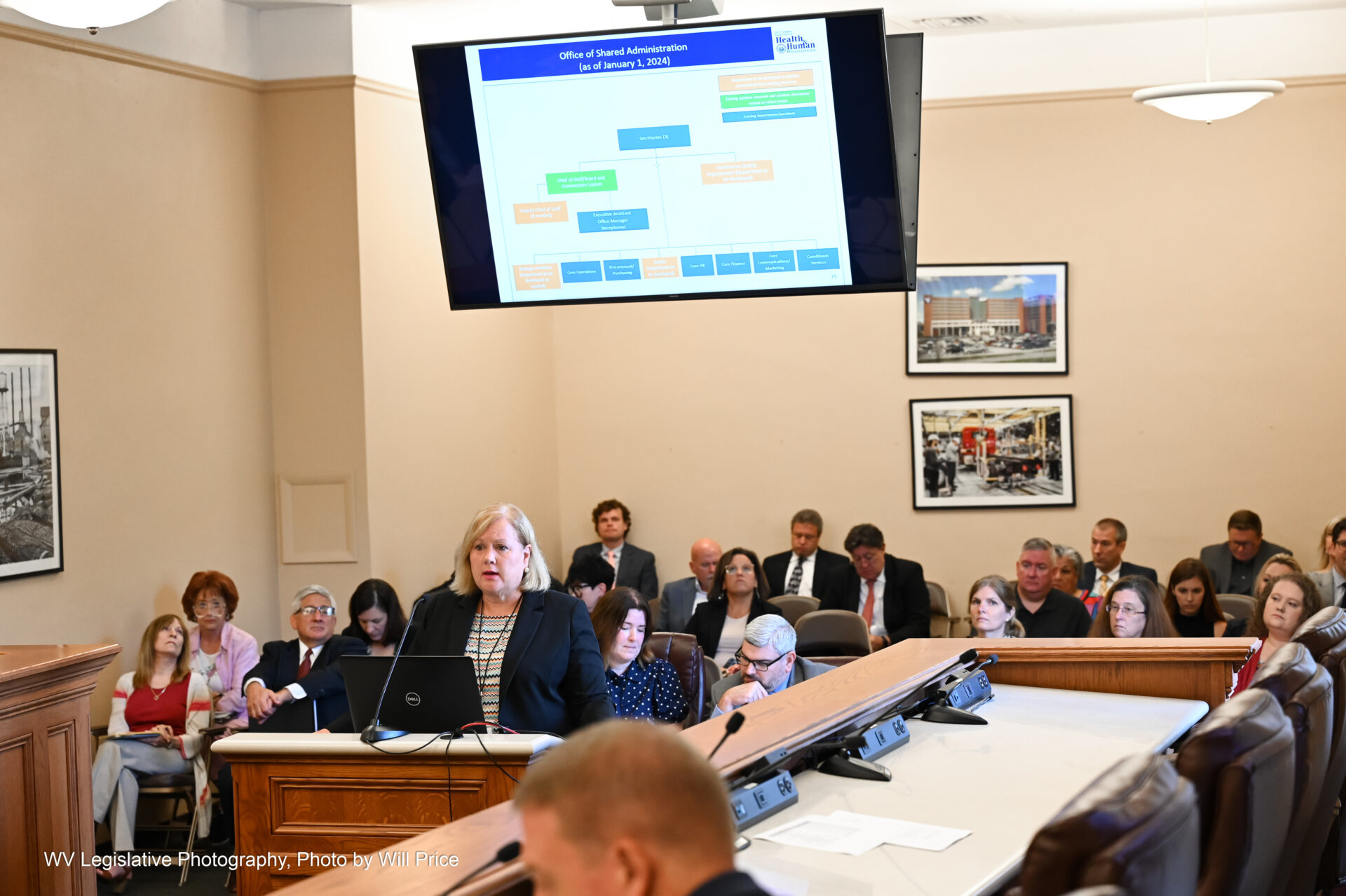The Department of Human Resources touches the lives of many West Virginians in one way or another. But the legislature determined that it was too large to be effective and split it into three departments: the Department of Human Services, run by Secretary Cynthia Persily, the Department of Health, run by Secretary Dr. Sherri Young, and the Department of Health Facilities, run by Secretary Michael Caruso.
The split takes effect on Jan. 1, 2024. The Office of Shared Administration consists of the three secretaries and heads the new organization.
These three departments will share six offices: the Office of Finance, the Office of Human Resources Management, the Office of Constituent Services, the Office of Communications, the Office of Operations and the Office of Management Information Services.
Young presented a “bird’s eye” view of the organization of the Department of Administration during a meeting of the Legislative Oversight Commission On Health and Human Resources Accountability (LOCHHRA) on Monday.
“This will be the last time that I address you as the interim secretary for DHHR,” Young said. “And in 20, short days, we will be the three departments that we have envisioned working towards.”
She said she anticipated a question and answer session between lawmakers and the heads of each of the six offices shared by the Department of Shared Administration and hoped it would quell lawmakers’ fears about overlap.
“They’re there to tell the story about what they do on a daily basis because it is truly immense the people that they serve and the programs that they cover,” Young said.
Del. Amy Summers, R-Taylor, asked Young if this new system was more efficient than past models.
“It’s very similar,” Young said. “And so when you’ve looked at the reporting structure, there could be some problems with having to go into the three departments. People have adjusted very well.”
Young began her presentation by explaining the Office of Finance, stating that 87 individuals work under Tara Buckner, chief financial officer. She said they oversee planning, coordinating, safeguarding and overseeing the daily financial operations.
Next, Young spoke about the Office of Human Resource Management under Chief Human Resources Officer, Angie Ferris.
“They are managing the benefits and payroll for 5,439 folks across DHHR,” Young said. “That takes about 76 folks.”
Young said the Office of Operations has 32 of 37 vacancies filled. She said this department, operated by George Montgomery, is responsible for the upkeep and management of the state’s health facilities, along with fleet management.
“They manage everything for real estate, making sure that the maintenance and warehouse and any new construction that you have, that these are getting executed as well as the large contracts to complete this work,” Young said.
The Office of Operations also takes care of the mail system within DHHR.
“The amount of mail that goes through that mail system, within a year we get on average 350 to 400 pieces of mail per day, and a staggering 90,000 to 105,000 pieces of mail passing through that office in the bottom of the Diamond building every year,” Young said.
Next, Young explained the structure of the Office of Communications, which contains five workers, two of whom are. Jessica Holstein and Whitney Wetzel. Both are listed as directors.
“We did name two directors so that we would have subject matter experts dealing with the Office of Human Services and then splitting the duties for the Department of Health and the Department of Health Facilities,” Young said.
According to Young, the Office of Constituent Services, directed by John Lopez, connects people with questions about their benefits with people who can help them within the agency.
“For 2021, they had 222,218 calls,” Young said. “For 2022, they had 222,336 calls, of which they answered and assisted folks. So far in 2023, they have had 434,385 calls as of last week. And we’re not quite to the finish line.”
Lastly, Young said that the Office of Management Information Services, directed by Chief Information Officer Shaun Charles, has 134 workers with 18 vacancies.
“They have the West Virginia ed(ucation) system, they support Bureau Medical Services data, both for verification and quality,” Young said. “But they also build and maintain internal and external dashboards.”
Young said she looked forward to letting the heads of the six offices explain their roles to lawmakers on Friday.
Other Action
The commission also considered four draft bills and unanimously passed them to the Joint Committee on Government and Finance for consideration during the regular session.
The first bill would remove “DHHR” from all state code, in line with the restructuring of the department.
The second bill removes a “drop dead date” placed in code which ended the authority of the department to keep foster care and managed care under Aetna management.
The third bill expands upon LOCHHRA’s own power, by allowing them to go into executive session in order to hear information from the departments of health, health facilities, and human services that is not able to be shared publicly.
Additionally, this draft bill would allow LOCHHRA to carry out performance evaluations of the departments.
The final draft bill creates a new chapter for the Office of the Inspector General to enhance its independence and takes the programs that are under the Office of the Inspector General and places those existing programs under the Inspector General.
Attorneys for the legislature called the bill a “reorganization and cleanup.”
The commission moved that all four bills be reported to the Joint Committee on Government and Finance with the recommendation that they will be introduced during the next regular session of the legislature.
Appalachia Health News is a project of West Virginia Public Broadcasting with support from Charleston Area Medical Center and Marshall Health.
